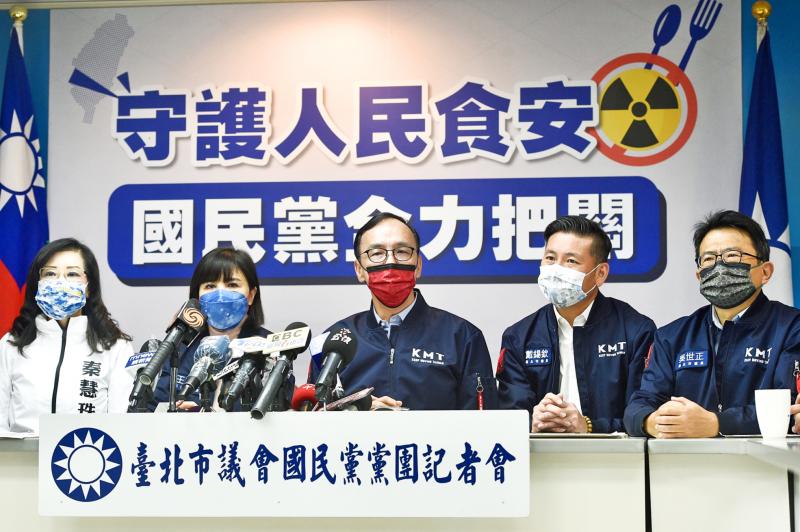Chinese Nationalist Party (KMT) caucuses in 22 cities and counties yesterday jointly declared that they would defend the nation’s food safety, as KMT Chairman Eric Chu (朱立倫) called for changes to the School Health Act (學校衛生法).
President Tsai Ing-wen’s (蔡英文) administration is failing to uphold food safety by lifting a ban on most food imports from five Japanese prefectures implemented after the 2011 Fukushima Dai-ichi nuclear power plant disaster, Chu told a news conference in Taipei.
KMT caucuses held similar news conference across the nation.

Photo: George Tsorng, Taipei Times
The government on Tuesday announced that it would end the ban on Feb. 28.
Ensuring food safety is a basic task of the government, and the KMT has worked to uphold the public’s right to clean and safe food, but the party has been accused of “not loving Taiwan” because it opposes lifting the ban, Chu said.
Local ordinances and the School Health Act should be amended to ban any foods containing residual radiation and prevent children from ingesting such food, he added.
Chu said that although the Democratic Progressive Party has claimed that existing laws are sufficient, Article 23 of the act stipulates that local produce should be prioritized, but does not say it should be the only source of food for schools, which provides a loophole to use food produced from areas affected by the nuclear disaster.
The Executive Yuan saying that local governments cannot implement stricter food safety regulations is the death of autonomous local rule, he said.
Local governments should enact legislation to offer food safety protection in areas where the central government’s laws fall short, Chu said.
Amicable Taiwan-Japan ties should not be a reason to import Japanese goods without question, nor should the government cite its application to join the Comprehensive and Progressive Agreement for Trans-Pacific Partnership as a reason to end the ban, he said.
Chu said that he had discussed the issue at length with New Taipei City Mayor Hou You-yi (侯友宜), who alongside other county and city KMT leaders agreed that taking a stand against the government’s Japan import policy was necessary.
Premier Su Tseng-chang (蘇貞昌) yesterday said that the School Health Act prioritizes the use of local produce not only because it allows children to recognize what is grown locally, but also because Taiwanese produce is fresh and of better quality.
Taiwanese customs would also implement strict screening of food imports, he added.
Additional reporting by Lee Hsin-fang

A Chinese aircraft carrier group entered Japan’s economic waters over the weekend, before exiting to conduct drills involving fighter jets, the Japanese Ministry of Defense said yesterday. The Liaoning aircraft carrier, two missile destroyers and one fast combat supply ship sailed about 300km southwest of Japan’s easternmost island of Minamitori on Saturday, a ministry statement said. It was the first time a Chinese aircraft carrier had entered that part of Japan’s exclusive economic zone (EEZ), a ministry spokesman said. “We think the Chinese military is trying to improve its operational capability and ability to conduct operations in distant areas,” the spokesman said. China’s growing

Nine retired generals from Taiwan, Japan and the US have been invited to participate in a tabletop exercise hosted by the Taipei School of Economics and Political Science Foundation tomorrow and Wednesday that simulates a potential Chinese invasion of Taiwan in 2030, the foundation said yesterday. The five retired Taiwanese generals would include retired admiral Lee Hsi-min (李喜明), joined by retired US Navy admiral Michael Mullen and former chief of staff of the Japan Self-Defense Forces general Shigeru Iwasaki, it said. The simulation aims to offer strategic insights into regional security and peace in the Taiwan Strait, it added. Foundation chair Huang Huang-hsiung

PUBLIC WARNING: The two students had been tricked into going to Hong Kong for a ‘high-paying’ job, which sent them to a scam center in Cambodia Police warned the public not to trust job advertisements touting high pay abroad following the return of two college students over the weekend who had been trafficked and forced to work at a cyberscam center in Cambodia. The two victims, surnamed Lee (李), 18, and Lin (林), 19, were interviewed by police after landing in Taiwan on Saturday. Taichung’s Chingshui Police Precinct said in a statement yesterday that the two students are good friends, and Lin had suspended her studies after seeing the ad promising good pay to work in Hong Kong. Lee’s grandfather on Thursday reported to police that Lee had sent

BUILDUP: US General Dan Caine said Chinese military maneuvers are not routine exercises, but instead are ‘rehearsals for a forced unification’ with Taiwan China poses an increasingly aggressive threat to the US and deterring Beijing is the Pentagon’s top regional priority amid its rapid military buildup and invasion drills near Taiwan, US Secretary of Defense Pete Hegseth said on Tuesday. “Our pacing threat is communist China,” Hegseth told the US House of Representatives Appropriations Subcommittee on Defense during an oversight hearing with US General Dan Caine, chairman of the Joint Chiefs of Staff. “Beijing is preparing for war in the Indo-Pacific as part of its broader strategy to dominate that region and then the world,” Hegseth said, adding that if it succeeds, it could derail